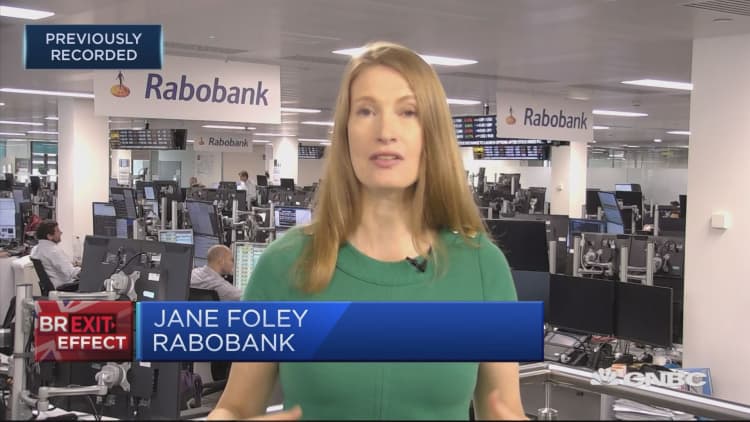
The potential implications of Brexit are extremely complex and sterling could move in a much more binary path in the next few months, Jane Foley, a foreign exchange strategist at Rabobank, told CNBC's "Street Signs" Wednesday.
"If you see the pound against the euro over the last few months then you see a deteriorating position for the pound," Foley said, adding that everybody is disappointed there hasn't been much progress over Brexit and "what we have seen in sterling is this concern that there is only few months left."
Sterling slipped to a two-and-a-half-week low against the U.S. dollar Wednesday morning on concerns over Brexit and escalating global trade tensions. The currency was trading 0.5 percent lower at midday London time, just below $1.28 levels. Against the euro, sterling edged 0.2 percent lower at 90.26 pence.
"Most commentators still have it as a view that a free trade deal will be done. If that changes, which it could do, I think that will be a real change in euro/sterling and we can see it break above 90 (pence). And I don't think that will happen," Foley added.
Former BOE chief slams Brexit
Sterling is still down by over 10 percent since the U.K. voted to leave the European Union in June 2016. The process to leave the bloc has proven long and rich in technical details. The departure date has been scheduled for March 29 next year — meaning that negotiators have about six months to conclude negotiations on aspects such as the movement of people and goods across the border between Northern Ireland and the Republic of Ireland.
The process has received criticism with the former Bank of England Governor Mervyn King slamming the preparations as "incompetent." A Brexit supporter in 2016, King told the BBC in an interview Wednesday that the government had weakened its bargaining position by not being prepared enough.
"We haven't had a credible bargaining position, because we hadn't put in place measures where we could say to our colleagues in Europe, 'Look, we'd like a free-trade deal, we think that you would probably like one too, but if we can't agree, don't be under any misapprehension, we have put in place the measures that would enable us to leave without one'," King told the BBC.
Carney to stay?
While politicians in the U.K. and the EU scramble to put a deal together, Rabobank's Foley warned that markets will react to anything.
"Clearly, whatever happens next year, there is going to be upheaval," she said.
She further added that the more uncertainty for the U.K. markets, i.e. a change to a new governor at the Bank of England, will just create even more upset.
"If we have consistency at the Bank of England, then that will help calm nerves to some extent. A different governor will open sterling to potential more vulnerability."
U.K. Prime Minister Theresa May has backed the current governor, Mark Carney, to remain in the job until 2020. This decision aims to give some stability to the U.K. economy while Brexit takes place.
Carney said Tuesday he was ready to extend his time in charge of the central bank to help Britain's economy as it leaves the bloc.


